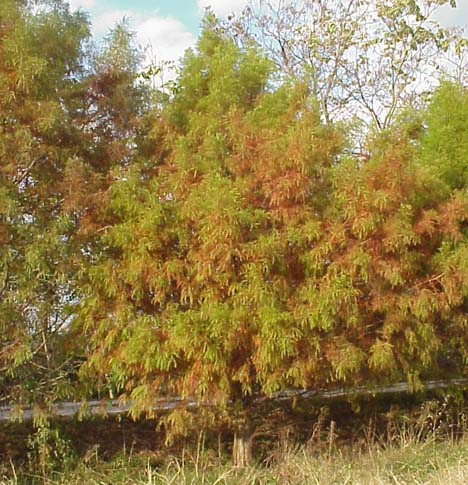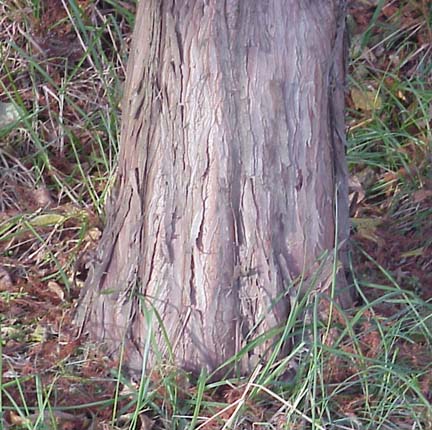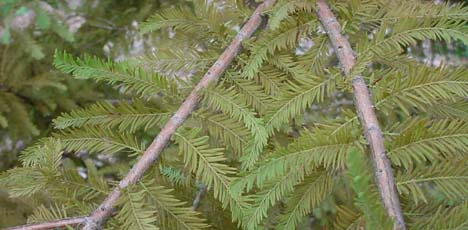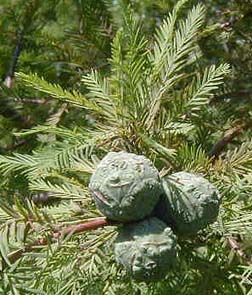Shape and Distribution
Bald cypress is a large tree, reaching heights
of 100-150 feet.
It is also referred to as swamp cypress, southern cypress, and
cypress.
The base of the trunk is enlarged, frequently buttressed and surrounded
by woody knees
(cone-shaped structures that grow vertically from the lateral roots
of the tree where the roots are at the soil/sediment surface).
The crown is typically
conical when the tree is young,
becoming flattened or more open by branching when
older.
Mature specimens can live 1000 years and are 30-35 feet in circumference
at shoulder height!
Bald
Cypress in Illinois field- age 7 years
Bald Cypress occurs naturally in swamps
and low, wet woods.
Mature Bald Cypress trees tolerate submergence, but the seedlings
are killed by it.
The seedlings must therefore become established during dry periods.
Interesting Facts
Bald Cypress is a deciduous conifer - it has cones
and sheds its needlelike foliage.
The leaves turn reddish-brown in the autumn
when the twigs with the attached needles are shed.
Development of bald cypress
knees was initially associated with the low oxygen environment in which the trees
grew.
The knees were interpreted to be an adaptive strategy to provide roots with
oxygen under flooded circumstances.
Experiments eventually demonstrated little
exchange of oxygen between roots and knees.
A more likely function of the knees
is to provide stability in the swamp substrate.
Bald cypress trees are among the
oldest in the state.
Individuals can live to be up to 1000 years old. It is the
state tree of Louisiana.
The third largest cypress in the world is in Heron Pond
near Cairo, Illinois.
Identifying Features
Bark
Bald
Cypress bark is reddish brown to gray, fibrous, and peels in long shreds.
The
trunk is flared at the base and surrounded by knees on wet sites. 
Twigs
The
terminal twigs are slender and the new growth is very light green, gradually darkening
and becoming reddish brown late in the season.
The lateral twigs are also green,
becoming reddish brown, but unlike the terminal twigs, they are shed with needles
still attached in the autumn.
Leaves
The
leaves are deciduous needles, alternate, and between 1/2 and 1 inch long.
They
are green, turning brown before they are shed. The male flowers are borne in
branched
clusters 5 inches in length and the female flowers are spherical and
occur near
the ends of the twigs.
Fruits
The fruits are cones with shield
shaped scales, 1 to 2 inches in diameter, and occur on a 1/2 inch long stalk.
They
are green when newly formed, becoming purple with age, and eventually disintegrating
(shattering).
Seeds
Seeds
are irregularly shaped wedges covered in a resinous coating which retards wetting
and resists insects.
It has a very pleasant aroma.
Seeds kept in cool storage
are viable for up to thirty months.
Seeds are planted in two ways.
Fall planting,
which is recommended for the southern range, requires seeding in a moist bed and
overwintering for Spring germination.
Spring planting which is recommended for
northern range requires 90 days of
soaking in water at a temperature between 32-40
degrees prior to seeding in a moist bed..
Viability of the seeds will depend upon
planting practices and initial weather conditions.
They are generally easy to
germinate when proper procedures are followed, but that is no guarantee against a
late frost or a dry summer.
Some practice soaking for 5 minutes in ethyl alcohol
and refrigerate (cold stratification). 
Uses
Bald
cypress wood is durable and soft, lightweight, and close grained
It is used for
general construction, railroad ties, fence posts, barrels, bridges, and shingles.
It
is so resistant to degradation that my great uncle who used to drill oil wells in
Louisiana
would hit old Cypress logs 2000 feet deep under the Delta mud.
When
they brought up, the rotary bit it would be clogged with wood!
The tree is planted
as an ornamental.
____________________________________________________________________________________________
